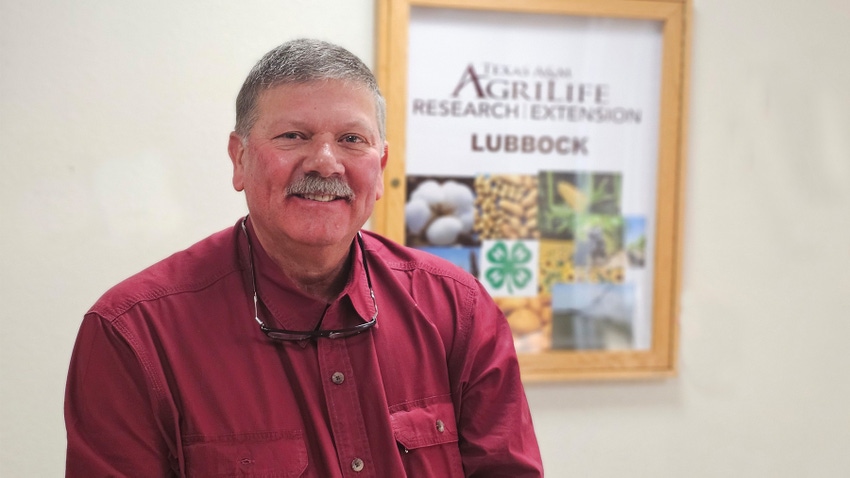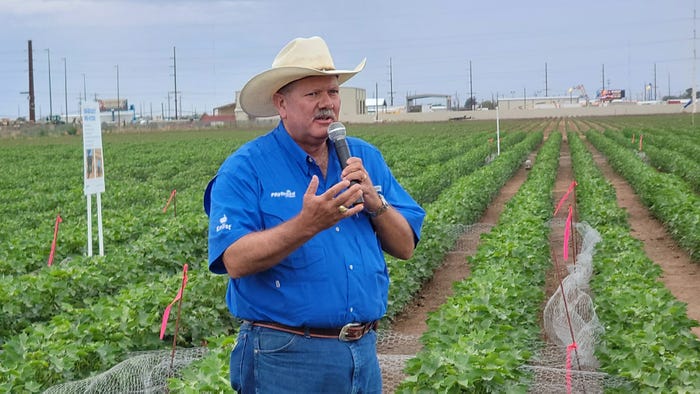
When Ken Legé showed up at Texas A&M University as a graduate student, he had never seen a cotton plant. But just like a field of white cotton in the fall captures attention, a cotton assistantship grabbed his, inspiring a 35-year career dedicated to cotton.
“Once you start working with cotton, you get the fever,” Legé told Farm Press. “It really gets in your blood.”
Legé is the new Extension cotton specialist at Lubbock’s Texas A&M AgriLife Extension & Research Center. While his career began as a cotton specialist at Clemson University, he’s spent much of his profession developing cotton varieties with companies such as, Monsanto, Delta and Pine Land Company, Sure-grow Seed and most recently, Corteva Agriscience.
The role of Extension cotton specialist is an opportunity to broaden his cotton focus. “I’m looking forward to working on other aspects of cotton agronomy beyond varieties. It’s still going to be variety focused but we’re going to expand the RACE trial effort and hopefully capture more information from those.”
RACE or Replicated Agronomic Cotton Evaluation trials, is a term coined by former Extension cotton specialists Randy Boman and Robert Lemon. “They came up with a really great idea,” Legé says. “Oklahoma also adopted the same name for the same type of trials.”
RACE trials are large on-farm plots, primarily variety trials, planted, managed and harvested by the grower with the producer’s equipment. “So, it makes it relevant to the grower community,” Legé says. “We then have it ginned and classed in a manner that replicates the commercial situation. That way when the growers see the fiber from these trials, as well as turnouts, it looks realistic.”
That’s the point of the RACE trials, “to fairly and uniformly evaluate varieties in on-farm situations across this region.”
Beyond the field, Legé’s also looking forward to the camaraderie shared among the specialists. “I like the tight-knit group of the cotton community, specifically the Extension cotton specialist group across the Belt. It’s a tight-woven group that exchanges ideas, and bounces things off one another.”
Communication
Legé says his new position has as much to do with communication as it does cotton. “When we’re all in graduate school as scientists, we’re taught to collect data. If we’re good, we turn that data into actionable information.”
He says the Lubbock center has a good team of scientists. “We’re very fortunate in West Texas to have not only the faculty here at the Lubbock center but also have a lot of collaboration with Texas Tech, West Texas A&M with Dr. Craig Bednarz, with all Extension agronomists, even Miss. Dudak in Oklahoma (the state’s new cotton specialist). So, there’s lots of information that needs to be communicated. If it’s sitting on a website or a shelf, it doesn’t do a lot of good.”
Conveying that information to producers and Extension agents is a top priority. “There’s a lot of good information that just simply needs to be out there,” Legé adds.
He describes his position as the “perfect job” within AgriLife Extension. “I enjoy the research aspect and the small plot situations, where you’re really focusing on a topic and trying to find an answer. But I also like putting that information together.”
Challenges
Legé’s coverage area stretches across portions of the Rolling Plains to the South Plains up into the Texas Panhandle—areas known as the world’s largest cotton patch. Water, or the lack thereof, is his region’s biggest challenge.
“Everything is about water in West Texas. Everything that you do, everything you research, everything you talk about has to do with declining water availability, and more importantly, how to efficiently capture those moments when you do have moisture, and how to grow that crop more efficiently.

Extension cotton specialist Ken Legé speaking to cotton producers at a 2022 PhytoGen Field Day. Legé' has been in the cotton industry for 37 years. (Photo by Shelley E. Huguley)
“That’s going to be a focus point on both the research program as well as the Extension program- everything that interacts with water, which is everything.”
His growers are coming off two very difficult production years. “As you know, being a farmer’s wife, farming in West Texas is a long-term approach. You have to look at it over a 10-year period. When you look at the data, about two of those years are going to be rough. Unfortunately, we’ve had two of those years back-to-back. Two of those 10 years are typically pretty good. We’re due.”
The 2024 forecast gives cause for optimism. “The meteorologists are talking about El Niño moving in and the drought monitor looks encouraging. Most areas are out of drought right now, so if we can get some more moisture, things are looking up.”
Legé admits growers have a long way to go. “I encourage growers to have a long-term approach,” says. “Watch your inputs. I always tell growers, don’t be distracted by the little rocks. Get your big rocks. In other words, get the fundamentals down.”
Legé defines those fundamentals as the following:
Have a sound weed control program based on residuals.
Monitor and manage insect pests.
Make sure your fertility is correct.
Purchase good, high-quality seed.
Place the right variety on the right acre.
Manage your irrigation.
“Then everything else or the little rocks you can fine-tune.”
100% cotton
Legé’s passion for cotton doesn’t end in the field. “I’m the biggest cheerleader for 100% cotton.” When shopping for his clothes, Legé’s wife asks retailers for 100% cotton. “They don’t really realize that they live in the biggest cotton patch in the world and how important cotton, the cotton industry, is to the region’s economy.
“Cotton demand is low right now. So, what can we do to affect demand as individuals? I say, wear 100% cotton. Get all your family and neighbors to wear 100% cotton because if you have cattle and maybe you go to an independent cattle association’s banquet, do you think they’re going to serve chicken? They’re going to serve beef because they’re going to support their own industry. We should do the same.”
About the Author(s)
You May Also Like






